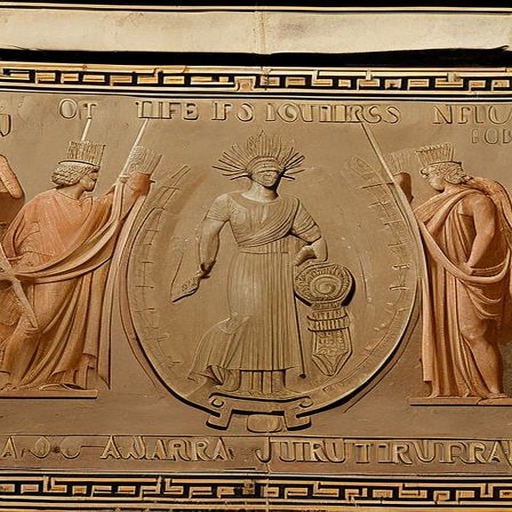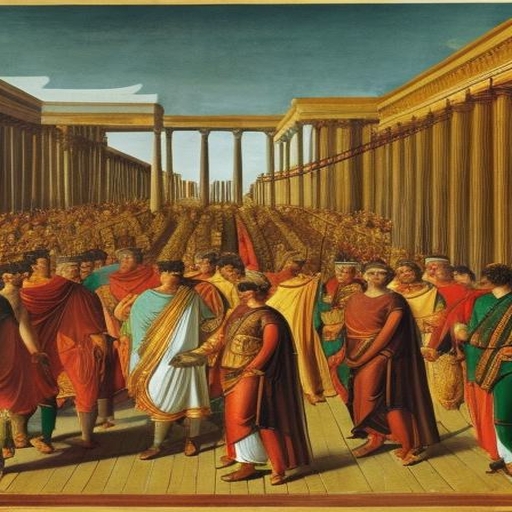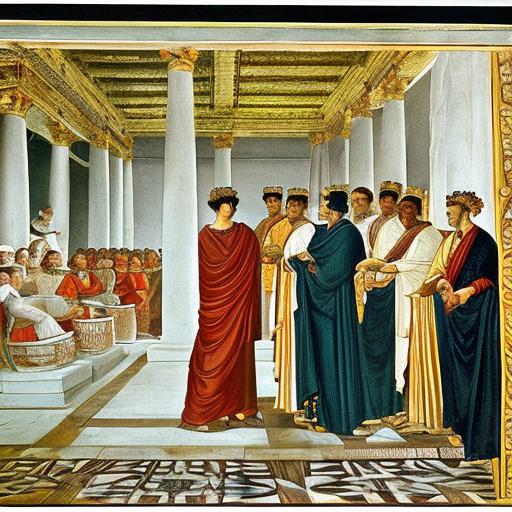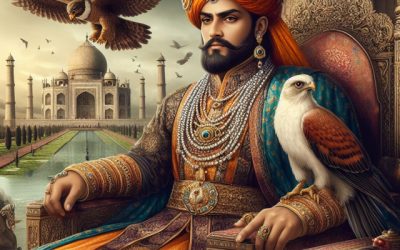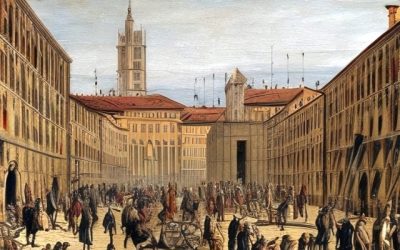Unveiling the Life and Legacy of Rome’s First Emperor
Welcome, dear readers, to a journey back in time to the vibrant and tumultuous era of ancient Rome. In this blog post, we delve into the life and reign of one of the most influential figures in Roman history, the illustrious Emperor Augustus. Known for his political genius, military triumphs, and enduring legacy, Augustus’ reign forever altered the course of the Roman Empire.
Early Life and Rise to Power
Born as Gaius Octavius Thurinus on September 23, 63 BCE, in the city of Rome, Augustus was destined for greatness. He hailed from a prominent and politically connected family, being the great-nephew of Julius Caesar, the celebrated general and statesman. Following the assassination of his great-uncle in 44 BCE, young Octavius embarked on a path that would eventually lead him to the imperial throne.
Under the mentorship of Caesar, Octavius honed his skills and political acumen. After forming the Second Triumvirate alongside Mark Antony and Lepidus in 43 BCE, Octavius set out to avenge Caesar’s death and solidify his claim to power. The ensuing power struggle between the triumvirs culminated in the Battle of Actium in 31 BCE, where Octavius emerged victorious, securing his dominance over Rome.
Imperial Reign and Political Reforms
With the triumvirate dissolved, Octavius returned to Rome, and in 27 BCE, he assumed the title “Augustus,” meaning “revered” or “venerable.” Augustus marked the dawn of a new era in Roman history, transforming the republic into an autocratic empire. While wielding absolute power, he skilfully maintained the illusion of republican traditions, making him a master of political subtlety.
Augustus embarked on a series of reforms aimed at stabilizing the empire and restoring its moral and social fabric. He implemented a comprehensive overhaul of Rome’s administrative apparatus, streamlining the bureaucracy and ensuring efficient governance. The establishment of the Praetorian Guard, a formidable military force sworn to protect the emperor, safeguarded his reign against internal threats.
Furthermore, Augustus sought to reinvigorate traditional Roman values and morals. He introduced legislation to promote family values, including laws encouraging marriage and childbearing. This emphasis on family became a cornerstone of Augustus’ reign, and he himself led by example, being married three times and fathering only one daughter, Julia.
Military Triumphs and Expansion
Augustus, an astute military strategist, expanded Rome’s territorial reach through a series of military campaigns. His conquests in Spain, Gaul, and Egypt brought immense wealth and resources to the empire. Augustus skilfully utilized his military successes to bolster his authority, ensuring his status as Rome’s supreme leader.
One of his most significant military achievements was the pacification of the troublesome frontier regions, including the Rhine and Danube. Augustus transformed these borderlands into thriving provinces, ensuring their defence against external threats and integrating them into the Roman fold.
Cultural Patronage and the Augustan Age
Augustus was not just a political and military leader but also a great patron of arts and literature. He fostered a cultural renaissance known as the “Augustan Age,” characterized by a flourishing of poetry, architecture, and literature.
Renowned poets such as Virgil, Horace, and Ovid flourished under Augustus’ patronage, producing timeless works that celebrated Roman history and mythology. The magnificent architectural projects initiated during his reign, such as the Temple of Mars Ultor and the Ara Pacis, showcased Augustus’ vision of a prosperous and united empire.
Legacy and Conclusion
Augustus’ reign laid the foundation for the Roman Empire’s stability and prosperity, setting the stage for several centuries of imperial rule. By consolidating power, reforming the state, and emphasizing moral values, Augustus shaped Rome’s political, social, and cultural landscape for generations to come.
His successors, known as the Julio-Claudian dynasty, attempted to emulate Augustus’ achievements but often fell short of his political prowess. Nevertheless, his legacy endured, serving as an enduring symbol of Rome’s golden age.
As we conclude our exploration of Augustus’ life, let us remember him as the emperor who navigated the treacherous currents of power, forever leaving his mark on the annals of history.
References
1. Eck, Werner. The Age of Augustus. Translated by Deborah Lucas Schneider. Oxford University Press, 2007.
2. Grant, Michael. The Twelve Caesars. Barnes & Noble Books, 1996.
3. Suetonius. The Twelve Caesars. Translated by Robert Graves. Penguin Classics, 2007.
4. Syme, Ronald. The Roman Revolution. Oxford University Press, 2002.
Bibliography
– Augustus. “Res Gestae Divi Augusti.” Translated by F.W. Shipley. Loeb Classical Library, 1924.
– Jones, A.H.M. Augustus. Norton, 1970.
– Potter, David. The Roman Empire at Bay: AD 180-395. Routledge, 2004.
Tags
Divi Meetup 2019, San Francisco
Related Articles
Unappreciated Greatness
Life and Legacy of Jahangir of the Mughal Empire. Jahangir ruled over one of the largest empires in human history during his lifetime, yet few people outside of South Asia have heard of him. I aim to shed light on the life and legacy of this remarkable figure,...
The Plague Doctor’s Diary
A Personal Account of the Turin Epidemic of 1656. I am writing this diary to record my experiences and observations as a plague doctor in Turin, the capital of the Duchy of Savoy, during the terrible epidemic that has afflicted this city and its surroundings since the...
The Timeless Beauty of Bustan
Unveiling the Secrets of Saadi Shirazi's Masterpiece.In the realm of Persian literature, few works have captured the essence of love, spirituality, and morality quite like Bustan (The Orchard) by Saadi Shirazi. This 13th-century masterpiece has left a lasting impact...
Stay Up to Date With The Latest News & Updates
Explore
Browse your topics of interest using our keyword list.
Join Our Newsletter
Sign-up to get an overview of our recent articles handpicked by our editors.
Follow Us
Follow our social media accounts to get instant notifications about our newly published articles.

